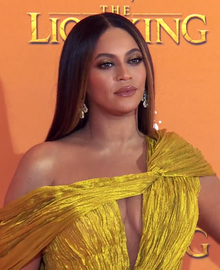Beyoncé
American singer
Beyoncé Giselle Knowles-Carter (born September 4, 1981) is an American singer, songwriter, and actress.

Quotes
edit- After having my daughter, I made a conscious effort to regain control of my health and my body. But I didn't want to do a crash diet. I was a mom now. I needed to change my ways and set an example for my child. … A year later (around November 2013), my husband and I decided we wanted to try a completely plant-based diet … And so the journey began that helped me get into the best shape of my life. Little did I know the long-lasting effects it would have. I thought, like with most diets, I would feel deprived and hate food, that I would miss out on restaurants and celebrations, that I would get headaches and be irritable, etc. I was wrong about all of that. It took a few days to adjust, but what I discovered was increased energy, better sleep, weight loss, improved digestion, clarity, and an incredibly positive feeling for my actions and the effects it would have on those around me and the environment.
- Foreword to Marco Borges's The 22-Day Revolution, New York: Penguin, 2015
- We have to care about our bodies and what we put in them. Women have to take the time to focus on our mental health—take time for self, for the spiritual, without feeling guilty or selfish. The world will see you the way you see you, and treat you the way you treat yourself.
- Anyone who perceives my message as anti-police is completely mistaken. I have so much admiration and respect for officers and the families of officers who sacrifice themselves to keep us safe. But let's be clear: I am against police brutality and injustice. Those are two separate things.
- "Beyoncé: 'Anyone Who Perceives My Message as Anti-Police Is Completely Mistaken'". Time. 5 April 2016.
- I'm not bossy. I'm the boss.
- "Beyoncé wants you to stop saying bossy'". Rolling Stone. 10 March 2014.
Remarks at a rally for the Kamala Harris presidential campaign (2024)
edit- We are at the precipice of an incredible shift, the brink of history. I’m not here as a celebrity. I’m not here as a politician. I’m here as a mother. A mother who cares deeply about the world my children and all of our children live in. A world where we have the freedom to control our bodies. A world where we’re not divided. Our past, our present, our future, merge to meet us here.
- It’s time to sing a new song. A song that began 248 years ago. The old notes of downfall, discord, despair, no longer resonate. Our generations of loved ones before us are whispering a prophecy, a quest, a calling, an anthem. Our moment right now. It’s time for America to sing a new song.
Our voices sing a chorus of unity. They sing a song of dignity and opportunity. Are y’all ready to add your voice to the new American song? Because I am. So let’s do this!
Quotes about Beyoncé
edit- (In one of your essays in the book, from 2012, you write about Beyoncé and Jennifer Lopez and say they are "[d]oing no more than supporting and promoting patriarchal and capitalist goals." Do you still feel this way about them, even as they—Beyoncé especially—are often held up as feminist icons?) AC: I do, but I know that I would have a lot of women of color of younger generations argue with me about that. I come from a generation of radical feminism; we believed in not using your body for financial gain and that sexualization fed into violence against women. I know that dates me. The performances that both Jennifer Lopez and Beyoncé give are highly sexually charged, and they've made a lot of money off of a lot of men by sexualizing themselves as exotic beauties. Both of them have dyed their hair blonde, straightened it, weaved it, which feeds into a fantasy about women and women of color. I come from a very different perspective, and I don't believe that anything in terms of personal gain or materialism is really helping the rest of the world. If you make that much money, instead of buying a humongous mansion, go back to your community and start community projects and talk to your legislators about changing some of the laws [that mean] young men of color who have felonies because [they dealt] drugs as teenagers can no longer integrate into society. Moving away from Beyoncé and J-Lo—I'm sure they do a lot of good deeds—I'm very lucky I have a roof over my head. I can eat healthy food, my children have coats in cold weather, they have an education. I don't think a human being needs much more beyond that.
- Ana Castillo Interview with Vice (May 2016)
- Someone else asks Davis if Beyoncé is a terrorist. The audience giggles, but the question is serious. During a panel discussion on liberating the Black female body earlier this year, feminist activist bell hooks described Beyoncé as a terrorist and antifeminist who was "colluding in the construction of herself as a slave." In an emollient reply, Davis said that she liked the fact that Beyoncé had sampled Nigerian novelist Chimamanda Ngozi Adichie's speech on feminism on her album. The following day, I ask Davis more about it. "Whatever problems I have with Beyoncé, I think it is so misleading and irresponsible to use that word in connection with her. It has been used to criminalize struggles for liberation. But we don't use the words terror and terrorism to describe US history and the racism of the pre-civil rights era."
- 2014 article in Conversations with Angela Davis Edited by Sharon Lynette Jones (2021)
External links
edit
| This musician-related article is a stub. You can help out with Wikiquote by expanding it! |